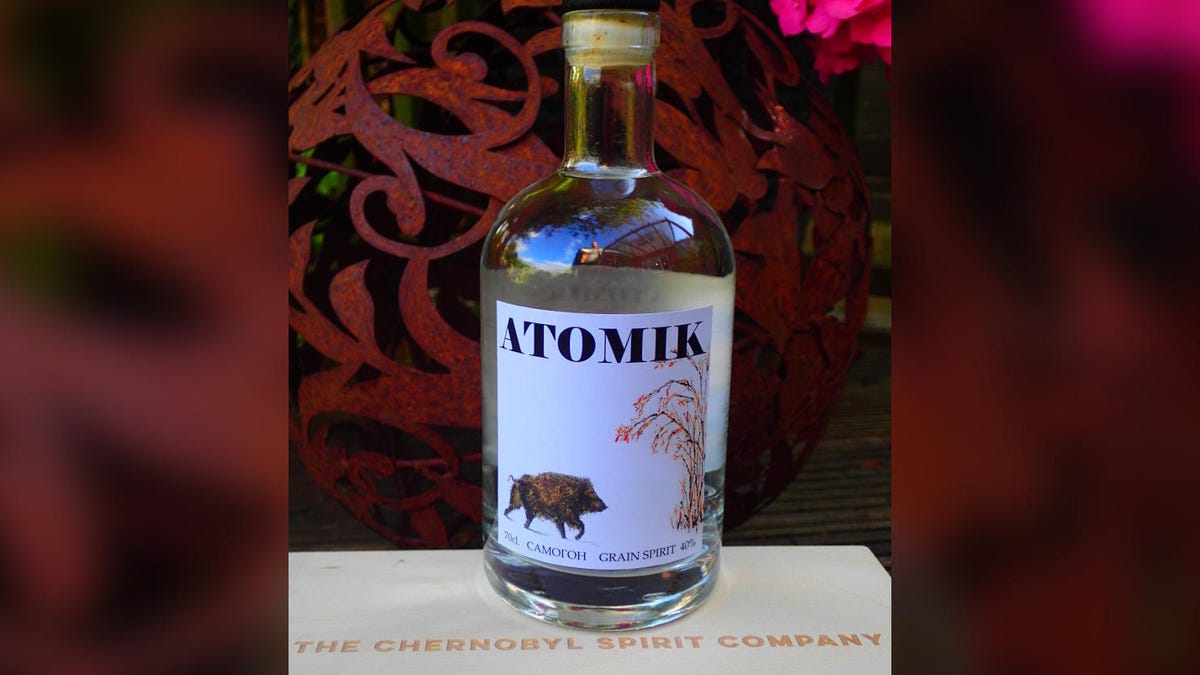Chernobyl vodka: Scientists distill spirit in radioactive exclusion zone
Yes, that's real Chernobyl vodka. No, you can't drink it (yet).

Bottle o' rads?
The nuclear meltdown at Chernobyl remains the worst nuclear accident in human history, leaving a 1,000 square mile region of the Ukraine uninhabitable since 1986. While some have continued to live there and tourists flock to the radioactive zone in droves (thanks to HBO's fantastic series), the surrounding areas have been reclaimed by nature. Now, the BBC reports, a team of scientists have produced the first consumer product out of the exclusion zone since the nuclear disaster: An artisan vodka dubbed "Atomik".
The Chernobyl Spirit Company, has brewed up the vodka from "slightly contaminated" rye grain they planted within the exclusion zone. While many traditionally think of vodka as produced from potatoes, these days most vodka is made from grains such as wheat and rye.
The one, the only (literally!) bottle of Atomik. Distilled in Chernobyl.
James Smith, an environmental scientist from the University of Portsmouth, is part of the team at Chernobyl Spirit Company and has published numerous studies discussing the effects of radioactive pollutants, with a focus on accidental releases. He's studied Chernobyl since 1990 and spent time working in Belarus, the Ukraine and Russia.
"Our Atomik grain spirit came from an experiment we were doing to see how much radioactivity transferred into different crops in the Exclusion Zone 30 years after the accident," he says, via email.
The experimental plot where the grain was grown is situated about 20 kilometers (12.5 miles) from the Chernobyl reactor. Part of the process also involved using water from Chernobyl's aquifer, lying about 10 kilometers (6 miles) south of the site of the disaster. The aquifer has been shown to contain traces of radioactivity in the past.
"We had the Atomik grain spirit idea as a way to firstly (hopefully) make people think more deeply about the recovery of the Chernobyl affected areas and a way (also hopefully!) to make money to help support the affected communities."
Smith has released a technical report of the creation process on ResearchGate. Part of the report discusses risks associated with the production of the vodka which he says it's completely safe.
"We had to do a risk assessment, but radioactive safety isn't really a problem," Smith says. "The beauty of distillation is that it takes nearly all the radioactivity out (except for natural C-14) so we hope people will be happy to drink Atomik."
However, there is one little problem. Anyone wanting to taste the nuclear nectar will have to wait because there is currently only a single bottle of the stuff in existence. Now, I know the internet will be clamoring for a taste, because humans have proven to be incredibly interested in seemingly forbidden liquids. I remember when some suggested we should drink the fluid from an ancient Egyptian sarcophagus that was discovered in 2018.
I know you want to taste the not-so-radioactive drop, but you'll have to wait.
The team plan to manufacture more Atomik before the end of the year, with the aim of making a profit they can then give back to the local communities that surround the abandoned exclusion zone. To really ramp up production, the team will need to get the go-ahead from the State Agency of Ukraine for Exclusion Zone Management and from Ukrainian authorities to produce alcohol, Smith says.
"Unfortunately this will be slow -- we hope to begin only very small scale experimental production this year," he notes, explaining the Chernobyl Spirit Company is "not taking orders yet."
When they do, we'll raise a glass.
Originally posted 10:55 p.m. PT
Updated Aug. 8: Adds additional comments from Smith and links to Spirit Company

